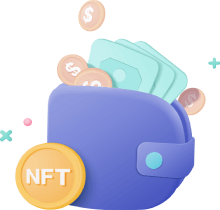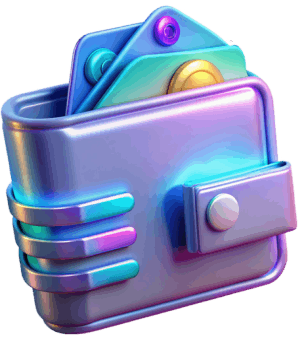What Are NFT Wallets?
An NFT wallet is a specialized digital wallet that is built to store NFTs. Unlike traditional cryptocurrencies such as Bitcoins or Ethereum, NFTs denote ownership of unique assets like digital art, music, or even in-game items, whereas they cannot be sold and exchanged equally on a one-to-one basis.
These wallets upload your NFTs onto the blockchain, where ownership of the assets is secured by private keys. Without a wallet, you can't interact with NFTs or use them on any marketplaces. Think of this as the digital safe where you keep your precious digital collectibles.
Why Do You Need an NFT Wallet?

NFTs are totally different from traditional cryptocurrencies, which are fungible and can be equally exchanged. Each NFT is unique, having a value in relation to its rarity, utility, and market demand. Since there is a huge difference between managing such assets and managing a crypto-token, an NFT-specific wallet becomes essential.
Other notable features are that they allow users to interact with dApps, participate in NFT-marketplaces, and handle several tokens on different blockchains (Ethereum, Solana, etc.). The NFT wallets provide security and make sure that only the rightful owners can access and transfer an NFT.
Types of NFT Wallets
There are several types of NFT wallets, all having different features and levels of security. Thus, it is very important to know their differences before choosing an NFT wallet.
Hot Wallets/Software Wallets
Hot wallets are the most common type of NFT wallets and are meant to be connected to the internet. They usually provide great user experiences and value accessibility and convenience, making them perfectly suited for folks who deal with NFTs and cryptocurrencies regularly. Key Features:
- Easy Access: Hot wallets can be used on devices like smartphones or computers.
- Convenience: You can quickly interact with NFT marketplaces and dApps.
- Low Security: Since hot wallets are in online space, they are subjected to hacking and phishing.
Some of the most popular names in the hot wallet business are MetaMask, Trust Wallet, and Coinbase Wallet.
Cold Wallets (Hardware Wallets)
Cold wallets basic definition means being a piece of hardware that stores your NFTs in the offline environment. These wallets are considered one of the safest as they are offline and cannot be prone to online attacks. Key traits:
- High-security level: Cold wallets keep NFTs offline from hackers.
- Less Convenience: Interacting with cold wallet to transfer NFTs require some physical presence, making it less convenient for frequently done transactions.
- Best for long-term storage: Perfect for users who plan to hold their NFTs for long periods without frequent trading.
Examples of cold wallets include Ledger Nano X and Trezor Model T.
Web Wallets
Web wallets are browser-based wallets, mostly provided by an NFT marketplace. It is one of the ways to quickly access NFTs and make seamless transfers right off the browser. Key Features:
- Easy to Use: Web wallets are in general very easy and convenient to use with no installation necessary.
- Integrated with Marketplaces: Many web wallets are optimized to work in direct conjunction with major NFT marketplaces to facilitate trading.
- Security Risks: Since web wallets work from within the browser, they are prone to being exploited.
Some popular web wallets include Metamask, Fortmatic, and Portis.
Mobile Wallets
Mobile wallets are opposite hot wallets specialized for use on mobile devices like smartphones and tablets. Great for users who want to manage their NFTs and carry them anywhere. Key Features:
- Portability: Mobile wallets offer quick access to NFTs and can be used anywhere.
- Convenience: Many such applications help users quickly scan the QR code to make a payment.
- Security Risks: They are connected to the internet just like other hot wallets and thus carry the risks normally associated with online storage.
The most popular mobile wallets for NFTs are Trust Wallet, MetaMask, and AlphaWallet.
Paper Wallets
A paper wallet is an offline way of storing NFTs. In most cases, it would be a printout of one's wallet private key or seed phrase. This way of storing NFTs is one of the cheapest, provided the paper is kept safely. Key Features:
- Offline Storage: Online hacking is impossible when the paper wallets are not connected to the internet.
- Highly Secure (if kept safely): Paper wallets can be extremely secure if kept away from harm.
- Inconvenient: Loss or damage to the paper would mean a total loss of access.
Well, it is definitely less common, but paper wallets are sometimes used by the most security conscious.
Choosing the Right NFT Wallet

Selecting a suitable NFT wallet will be entirely dependent on your needs. For active traders who trade regularly and need quick access to their NFTs, choosing a hot wallet or web wallet would be viable. Consider a cold wallet if security is of utmost importance and regular access to NFTs is rarely needed.
Securing Your Digital Treasures
An NFT wallet forms an integral part of the NFT ecosystem, in which users store, manage, and securely transact their digital assets. Knowing the types of wallets there are, be it hot or cold, mobile or web, would allow one to choose the right one for himself or herself. NFT security and functionality will continue to evolve alongside the NFT space. It is good to have a wallet that suits your need for security, convenience, and investment in NFTs.
Quick Links
🙄What is #NFT?
— VIW (@VIW_World) February 27, 2023
💡Non-fungible tokens are unique and similar to non-identical citizenship cards. NFTs are guaranteed unique by permanently leaving transaction details on the #blockchain.
🔗Detailhttps://t.co/KFx3AY90fN pic.twitter.com/FKHSKYQgga